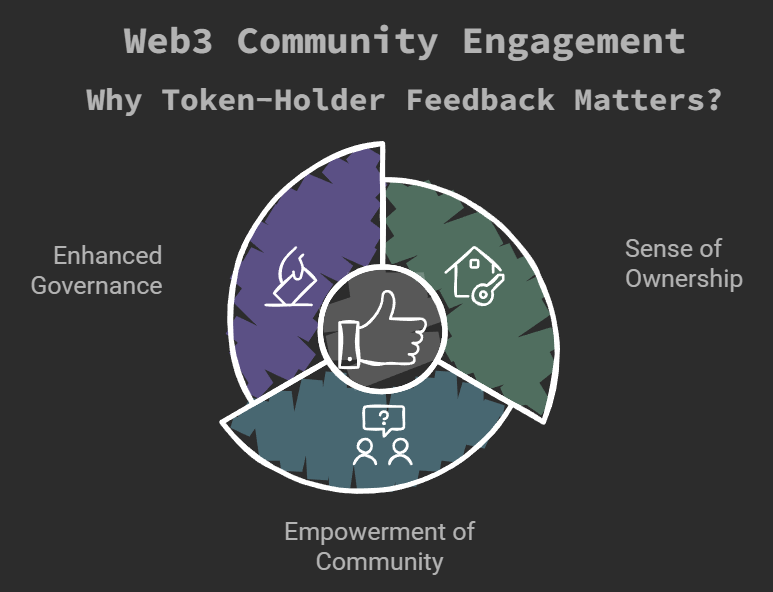Get insights.
Unlock value.
- 14-day free trial
- Set up in minutes
- No credit card required
Role Of Token-Holder Feedback In Community Development
Token-holders usually hold a Web3 project’s native token.
They are the authentic investors in a Web3 project. But, they bring more than capital. They have a greater responsibility in ensuring the success of a project.
Token-holders provide ideas and are committed to the growth of a community. They act as the lifeblood of decentralized communities.
With their valuable insights, token-holders are instrumental in the growth & development of a community. Their feedback is worthy. Effectively giving & receiving feedback is a balancing act.
Without feedback, a community becomes stagnant with no room for improvement. Also, the community manager will become clueless about what’s working and what’s not working in the community.
This blog delves into the role of Token-Holder Feedback in community development.
Why Token-Holder feedback matter?
Below are 3 strong reasons that convey the need for Token-Holder feedback.

-
Gives a sense of ownership
Knowing their feedback is valued gives token-holders a sense of ownership. They become more committed to the growth of the community. They look forward to active participation in the community. Feedback ensures community goals are aligned with the interest of the token-holder.
-
Empowers the community
Token-holder feedback empowers the community. The community receives the collective intelligence of all the token-holders. The community managers can perceive different views from each of the token holders. Most importantly, feedback ensures token holder’s voice is heard.
-
Enhances the governance
Ensuring everyone participates in governance is a Web3 ethic. Token-holder feedback paves the way for democratic community governance. The feedback plays a major part in DAOs & guides decision-making.
Token-Holder Feedback Types
Let’s jump to understanding different Token-holder feedback types. Feedback is received at different stages, starting from day-to-day operations, and community governance to expansion plans.
-
Feedback on everyday Operations
Operational feedback steers the day-to-day operations within the Web3 community. This type of feedback helps improve the daily operations. Usually, improvements to user experience & technical functions are done based on Operational feedback.
E.g. question: What features would you like to see implemented in our project?
-
Feedback on community governance
Thoughts on Community governance regulations are received through this type of feedback. The Token-holders have their say on voting mechanisms & proposal evaluations. This feedback plays a major role in shaping the governance framework of the community.
E.g. question: How satisfied are you with the current voting process?
-
Feedback on expansion plans
This type of feedback steers the long-term vision of a Web3 project & community. It helps align the goals, vision & direction of the community with token-holder interests. Important partnerships & expansion plans are enabled through Strategic feedback.
E.g. question: How well does our community vision aligns with your aspirations?
Token-Holder Feedback Channels
Let’s discuss different channels to receive token-Holder feedback.
-
Surveys
Surveys help gather structured feedback in a controlled & consistent manner. It helps gather feedback on a specific topic. They are usually deployed to receive feedback on quantitative factors like the satisfaction levels of token-holders in the community.
-
Social Media
Twitter & Discord are the most popular social media in the Web3 Industry. You can also try Web3 social media alternatives like Mastodon, Lens, Damus, Farcaster & Hive. Social media help gather real-time feedback from large audiences. It is usually used for informal interactions.
-
On-Chain Voting
This type of feedback is received directly on the BlockChain. Any data on BlockChain is verifiable & tamper-proof, and so is the On-chain feedback. It is used to receive feedback on funding allocation for DAOs.
Token-Holder Feedback Challenges
Do you know? There are also challenges in receiving Token-Holder feedback. Let’s discuss those challenges here.
-
Low participation
Token-holders may feel disconnected, uninformed, & unmotivated sometimes, which leads to low participation while receiving feedback. With low participation, there is no accurate reflection of the token-holder’s collective feedback.
-
Privacy concerns
Privacy remains a key concern among token-holders. Privacy concerns lead to reluctance to provide honest & open feedback. This further leads to the collection of incomplete and biased feedback from the Token-holders.
-
Feedback Fatigue
The token-holders may feel exhausted, overwhelmed & disinterested when frequent feedback requests are sent. This feedback fatigue not only reduces the quantity of feedback but also the quality of the feedback.
In this next section, find out how BlockSurvey can help address these challenges.
How BlockSurvey can help?
- BlockSurvey data collection tool has a user-friendly & intuitive interface. This allows token-holders to participate in the survey easily. The token-holders need not face any technical hurdles. This in turn paves the way for higher participation rates.
- Anonymous seal is a BlockSurvey feature that restricts the collection of Personally identifiable information in surveys. Moreover, BlockSurvey is end-to-end encrypted. With no privacy concerns, token-holders can provide honest & open feedback.
- Token-gated feedback ensures your surveys are taken only by token-holders after verification of tokens from their wallet. With this feature, your surveys are taken only by qualified respondents. This means not all surveys should be taken by every token-holder, beating feedback fatigue.
Case Study: Token Holder Feedback
- Uniswap is a decentralized exchange on the Ethereum Blockchain. Uniswap investors hold UNI token. This community heavily relies on token-holder feedback, to propose and vote on major protocol changes. Community forums & On-Chain voting are their popular feedback channels.
- MakerDAO is a Decentralized Autonomous Organization. MakerDAO stakeholders hold MKR tokens. This DAO adjusts its risk parameters through token-holder feedback. Community calls & Forums are their feedback channels.
Conclusion
In the above discussions, we see that Token-holder feedback is invaluable for Web3 communities. The feedback guides the overall direction of the Web3 project. Most importantly, they drive success based on collective insights.
Why not try BlockSurvey today, to overcome the challenges in collecting Token Holder feedback? BlockSurvey is User Friendly, Anonymous, Token-Gated, Social Media Gated & AI-driven.
Role Of Token-Holder Feedback In Community Development FAQ
What are some best practices for encouraging Token-holders to provide feedback?
To encourage Token-holders to provide feedback, it's essential to create an inclusive and engaging environment. This can be achieved by offering incentives, ensuring transparency in how feedback will be used, and minimizing the time and effort required to participate in feedback processes. Additionally, using anonymous and secure platforms like BlockSurvey can help alleviate privacy concerns and increase participation.
How can Web3 communities ensure the feedback they receive is actionable and not just a collection of opinions?
Web3 communities can ensure feedback is actionable by categorizing the feedback based on relevance. Setting clear objectives for feedback sessions and using structured methods like surveys can help. Following up on feedback with concrete actions helps validate the process.
What strategies can be used to overcome low participation in feedback processes among Token-holders?
To overcome low participation, communities can increase engagement by regularly communicating the importance of feedback, showcasing the impact of past feedback, and simplifying the feedback process. Offering rewards can also help boost participation rates.
How can Web3 communities balance the frequency of feedback requests to avoid feedback fatigue among Token-holders?
Balancing the frequency of feedback requests can be achieved by planning and prioritizing feedback sessions. It’s important to only request feedback when it’s truly necessary. Additionally, offering options for Token-holders to provide feedback at their own pace can help reduce fatigue.
Get insights.
Unlock value.
- 14-day free trial
- Set up in minutes
- No credit card required


